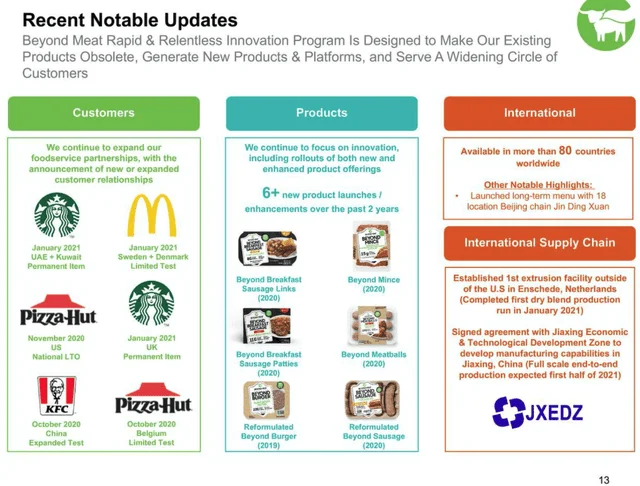Article Directory
Generated Title: Beyond Meat's Stock Didn't Just Crash. It Evaporated.
Let’s get one thing straight. If you bought $1,000 worth of Beyond Meat stock five years ago, back when it was the messiah of the meatless future, your investment today would be worth a whopping $4.28.
No, that’s not a typo. Four dollars and twenty-eight cents. You couldn't even buy one of their overpriced burgers with what’s left of your thousand bucks.
This isn't a stock market correction. This is a public vanishing act. Beyond Meat, the company that was supposed to revolutionize our plates and save the planet, has seen its value collapse by 99% from its peak. It’s now a penny stock, trading for less than a gumball. The dream of a plant-based utopia didn't just die; it was unceremoniously shoved into a woodchipper.
And the final, fatal push came from the company itself.
A Financial Move or a Public Execution?
The catalyst for this final implosion was a debt restructuring deal. Beyond Meat’s stock collapses after debt deal. Now, that sounds like a boring, responsible thing a company does, right? A bit of financial housekeeping.
This was a bad deal for shareholders. No, 'bad' doesn't cover it—this was a public execution. To stave off its creditors, Beyond Meat got approval to issue up to 326 million new shares. To put that in perspective, that’s more than four times the number of shares that previously existed.
This is like trying to put out a fire in your kitchen by opening every fire hydrant on the block and flooding the entire town. Sure, the kitchen fire is out, but now everyone’s house is underwater. Every single person who held a share saw their ownership stake in the company get diluted into near-nothingness overnight. The stock, predictably, plunged below $1.

It’s a desperate, last-ditch move from a company that has been bleeding cash since day one. They have never turned a profit. Not once. But why did it have to be this way? Was this truly the only path forward, or was it just the path that allowed the C-suite to keep the lights on for another few months while sacrificing their investors at the altar of survival?
The "Cultural Moment" Excuse
So how does a company explain this kind of catastrophic failure? If you’re CEO Ethan Brown, you blame the culture. He told analysts that animal meats are having a "moment" and that his company is just on the "other side of the particular moment." He also blames a "headwind of misinformation" about his products being processed.
Give me a break.
Let’s translate that corporate-speak. "A renaissance around animal protein" means "people remembered they like the taste of a real burger." And the "headwind of misinformation" is just... people reading the ingredients list. You can’t slap a health halo on a product that is, at its core, a highly processed concoction of pea protein, oils, and various binders and call anyone who points it out a liar. It’s the kind of logic that makes my head hurt.
This ain't about a "cultural moment." It's about price and taste. The entire plant-based industry has seen sales plummet because, offcourse, when inflation is kicking everyone in the teeth, people aren't going to pay two or three times more for a pea-patty that doesn’t taste as good as the real thing. It's that simple. It reminds me of wandering through a Whole Foods and seeing some "activated charcoal" juice for $12 and wondering who on Earth is actually buying this stuff.
They want us to believe this is just a 'cultural moment' passing, but honestly... I think the moment has passed for good. The company is now trying to pivot, releasing "less processed" versions of its products and getting endorsements from the American Heart Association. But is anyone still listening? Can you really put the genie of "ultra-processed" back in the bottle once it's out?
The Hype Train Finally Hit a Wall
Let's be real. Beyond Meat was never just a food company. It was a tech company that sold a story—a story about the future of food, about sustainability, about moral superiority at the dinner table. And for a while, Wall Street and the media bought it hook, line, and sinker. But you can't eat a story. At the end of the day, the product has to stand on its own, especially when it costs more than the thing it's trying to replace. The hype has evaporated, and all that’s left is the grim reality of the balance sheet. This wasn't a market shift; it was a reality check.
